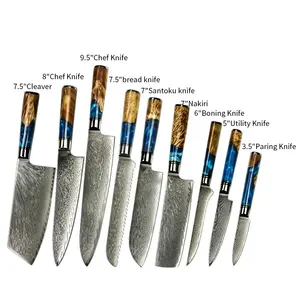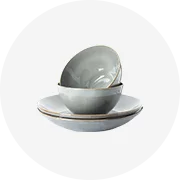Damascus Knife: An Overview
The term Damascus knife refers to a category of kitchen cutlery known for its distinctive pattern of banding and mottling reminiscent of flowing water. Often lauded for their durability and sharpness, these knives are crafted through a process of folding and forging multiple layers of steel. This category encompasses a variety of knives, each tailored for specific culinary tasks.
Types and Uses of Damascus Knives
Within the realm of Damascus knives, there are several types designed for particular uses in the kitchen. The chef knife, a staple in this category, is versatile for tasks such as chopping and dicing a multitude of vegetables. Its broad heel allows for robust use, suitable for denser foods. In contrast, the utility knife, while bearing resemblance to the chef knife, is smaller and more suited for intricate tasks with its sharp, tapered tip. For delicate work such as peeling or trimming, the paring knife is the go-to with its short, agile blade. Specialized versions like the bread knife, with its serrated edge, are optimized for slicing soft foods without crushing them.
Features and Materials
The construction of a Damascus blade is a testament to the art of metallurgy, where high-carbon steel layers are forged with softer iron to create a tough, resilient edge. The forging process not only contributes to the unique pattern but also to the blade's core strength, allowing for prolonged sharpness and ease of honing. The handles of these knives are often made from materials like wood, bone, or synthetic composites, providing a comfortable grip and balance that complements the blade's performance.
Advantages of Damascus Knives
A Damascus steel knife is not just a tool but an investment in quality and craftsmanship. The layered steel construction offers flexibility and edge retention, reducing the frequency of sharpening. Moreover, the inherent patterns on the blade make each Damascus knife a unique piece, combining functionality with aesthetic appeal. The variety within this category ensures that there is a Damascus knife suitable for every culinary challenge, from boning and carving to slicing and dicing.
Care and Maintenance
Maintaining a Damascus kitchen knife involves regular honing and proper storage. It is recommended to use a wooden or soft plastic cutting board to maintain the edge's integrity. Hand washing and immediate drying are crucial to preserving the knife's condition, as prolonged exposure to moisture can damage both the blade and handle. With appropriate care, a Damascus knife can provide exceptional service for years to come.
Choosing the Right Damascus Knife
Selecting the appropriate Damascus chef knife or specialty knife depends on the intended use. It is essential to consider the size, weight, and balance of the knife, as these factors significantly impact its performance and the user's comfort. While Alibaba.com does not endorse any particular brand or manufacturer, the platform offers a vast selection of Damascus knives to cater to the diverse needs of culinary professionals and enthusiasts alike.








































 浙公网安备 33010002000092号
浙公网安备 33010002000092号 浙B2-20120091-4
浙B2-20120091-4